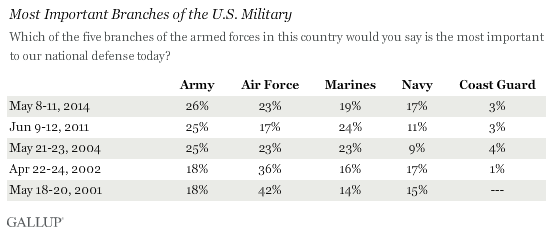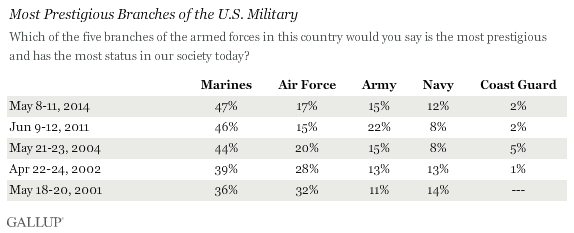WASHINGTON, D.C. -- Americans believe that the U.S. Army is the most important service branch to national defense, followed closely by the Air Force. Fewer than one in five choose the Marine Corps or the Navy. The Army has edged out other military branches in Gallup surveys conducted throughout the last decade.

Army Still Most Important, Likely Because of Conflicts in Iraq and Afghanistan
Gallup started asking Americans about the importance of U.S. military branches in the 1940s, using a variety of questions over the years. Americans until the mid-2000s always viewed the Air Force as the most important branch of the military. And while it still ranks high today, it no longer dominates. This shift in opinion most likely stemmed from the heavy ground combat in Iraq and Afghanistan in the 2000s and early 2010s. The Army, the largest branch of the military, has likely improved its standing in the U.S. public's eyes as a result of the role it played in these conflicts. Because the United States is far removed geographically from Europe, Asia, and the Middle East, historically air power and sea power have enjoyed prominence among Americans in terms of national defense.
Marines Continue to Lead in Prestige; Coast Guard Trails Other Branches
Importance does not necessarily equal prestige, however. While the Army has held a thin lead in perceived importance to the United States' national defense over the last decade, the Marine Corps has consistently been considered the nation's most prestigious military branch, widening its lead over the Air Force and Army during the same period. Currently, nearly half of Americans (47%) say the Marines are the most prestigious, with the Air Force a distant second, at 17%.

Prior to 9/11 and the Iraq and Afghanistan wars, a May 2001 Gallup poll found that Americans narrowly considered the Marine Corps the most prestigious military branch over the Air Force. Since 2002, the American public's admiration for the Marines has clearly increased. This might be attributable to the Marines' conspicuous presence in movies, television, and other forms of media. Further, the Marine Corps, being a smaller force, may be considered to be more "elite" with higher standards.
Despite successful Navy SEALs raids that killed al Qaeda leader Osama bin Laden in 2011 and helped rescue the captain of the merchant marine vessel Maersk Alabama from pirates in an incident that was the basis of the movie "Captain Phillips," the Navy's image has not benefited -- 12% in the U.S. say the Navy is the most prestigious branch. Perhaps related to its more modest presence on the defense landscape, only 2% of Americans say the Coast Guard is the most prestigious.
Bottom Line
The U.S. has long held a fascination with its military, which prior to the first decades of the 20th century consisted entirely of ground and naval forces. Air power clearly came into its own during World War II, the wars in Korea and Vietnam, and particularly in the Gulf War in 1991. For all of that time, Americans consistently viewed the Air Force as the most important branch of the military.
Since the very first years of the new millennium, the Army has received top billing as the most important branch, likely a result of the pressing combat operations in the Middle East and Central Asia. This may also be related to the Army's sheer size, with the large number of bases it has nationwide, the prominence of the branch in ongoing news reports about the wars, and the likelihood of Americans knowing soldiers heading to or returning from deployments.
As ground combat forces have seen a decreased role in the last few years, unmanned aerial vehicles (UAVs) or drones have become increasingly visible and important for national defense efforts. Although other branches use UAVs, the Air Force may benefit more from this development because of its primary use of air power, and this may contribute toward an increased appreciation of the Air Force. Similarly, the announcement of an updated U.S. strategy "rebalancing" toward Asia in 2011 has coincided with Americans' higher regard for the importance of the U.S. Navy for national defense.
Americans don't necessarily view the branches as the same in importance and prestige. They clearly see the Marine Corps as the most prestigious. The Marines have benefited from being viewed as an expeditionary force central to U.S. wars over the last century, along with an omnipresent advertising campaign touting "the few, the proud." The trend of prestige has been rising since the beginning of the 21st century, and may continue in the next few years.
Survey Methods
Results for this Gallup poll are based on telephone interviews conducted May 5-8, 2014, on the Gallup Daily tracking survey, with a random sample of 1,028 adults, aged 18 and older, living in all 50 U.S. states and the District of Columbia.
For results based on the total sample of national adults, the margin of sampling error is ±4 percentage points at the 95% confidence level.
Interviews are conducted with respondents on landline telephones and cellular phones, with interviews conducted in Spanish for respondents who are primarily Spanish-speaking. Each sample of national adults includes a minimum quota of 50% cellphone respondents and 50% landline respondents, with additional minimum quotas by time zone within region. Landline and cellular telephone numbers are selected using random-digit-dial methods. Landline respondents are chosen at random within each household on the basis of which member had the most recent birthday.
Samples are weighted to correct for unequal selection probability, nonresponse, and double coverage of landline and cell users in the two sampling frames. They are also weighted to match the national demographics of gender, age, race, Hispanic ethnicity, education, region, population density, and phone status (cellphone only/landline only/both, and cellphone mostly). Demographic weighting targets are based on the most recent Current Population Survey figures for the aged 18 and older U.S. population. Phone status targets are based on the most recent National Health Interview Survey. Population density targets are based on the most recent U.S. census. All reported margins of sampling error include the computed design effects for weighting.
In addition to sampling error, question wording and practical difficulties in conducting surveys can introduce error or bias into the findings of public opinion polls.
View survey methodology, complete question responses, and trends.
For more details on Gallup's polling methodology, visit www.gallup.com.
